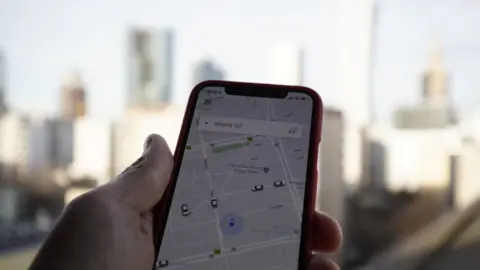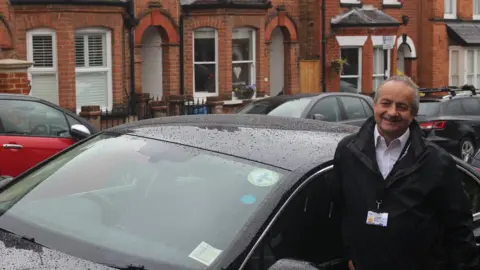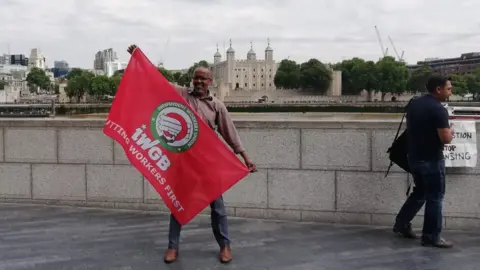What do drivers think of Uber?
 Getty Images
Getty ImagesUber, the firm behind the taxi-hailing app, will list its shares on the New York Stock Exchange on Friday.
The company plans to raise $10bn by selling shares, which could mean a valuation of $90bn for the company.
But ahead of the sale, drivers in the UK and US are striking over pay and conditions. They want more money to go to them, rather than investors.
The BBC spoke to two drivers who describe what it is like to work for the firm.
Garry Barone
 Garry Barone
Garry BaroneGarry Barone started driving for Uber in London in September 2015, after being made redundant from a career in the travel and leisure industry.
"I really needed an opportunity," he says. "I'm 60 next week, so it was an opportunity where I could make money and support my family."
He says he never intended to do it for long, "but I realised I liked it and I was wasting a large amount of time applying for other jobs".
He is doing about 45 hours of driving for Uber a week, in order to earn what he needs to replace the income he lost, he says.
Missed camaraderie
He pays Uber 20% of his fares. The terms for new drivers changed in London in 2016. They now pay 25%.
"Nothing has changed since when I read the terms, and I thought yes, this is fair.
"The sacrifice you make for the freedom is you don't get holiday pay. A lot of drivers have other jobs. They can fit Uber around other things in their life."
He starts work at about 15:00 and drives until midnight or 01:00.
"When I was an employee I was doing more than that in the office and commuting 10 hours a week," he says. With his new job, there's "no commuting, no homework. I can be totally relaxed on holiday".
However, one thing he misses is the camaraderie of being part of an office, he says.
'A godsend'
The company's set-up also makes things less stressful, he says. Customers can't haggle about the price of the trip or dodge the fare and there's no risk of being robbed, since Uber takes care of payments. And ratings keep passengers on the straight and narrow, he says.
He estimates he's had six bad fares in his 16,000 trips so far.
"A lot of people criticise it," he says. "But what an amazing opportunity." Drivers who are "hungry" and prepared to do long hours and days can make £50,000 a year, he estimates, before costs. And while other zero-hours jobs can mean being under-employed, Uber drivers can switch on the app if they want to work.
"I don't really know what I would have done" without working for Uber, he says. "It's been a godsend."
Muhumed Ali
 Muhamed Ali
Muhamed AliMuhumed Ali has worked for Uber in east London for four years and is a member of the Independent Workers Union of Great Britain which went on strike on Wednesday over drivers' pay and conditions.
He has been driving cabs since 2011.
"It is getting harder to work for Uber because the cost of driving is very high and the fare is very low. We want Uber to increase the fare and reduce the commission because it gets a fixed proportion of the fare."
Minicab drivers get between £1.80 and £2 per mile, while Uber drivers receive £1.25, he says.
People he knows who used to be minicab drivers have had to become Uber drivers as the platform has undercut the competition, he says.
'Happy drivers'
"You are forced to go to Uber," he says.
Will customers pay the difference? "I think so," he says. Things are better "when the driver is happy, when you are working for pennies, you don't care about customers".
To make ends meet, he has to drive 60 hours a week. "That's the minimum I have to do to make a living," he says.
Part of the problem is the costs he must pay in London, he says. Driving into central London on a weekday he must pay the Ultra Low Emission Zone (ULEZ) charge of £12.50 and the congestion charge of £11.50 - something black cabs don't pay.
Paying the costs
He must pay this even if only one of his fares requests a stop in the centre of London, he says.
On top of this, fuel, insurance, car maintenance and buying a car in the first place, are all costs he must bear.
Speaking on World Business Report on World Service radio he says: "I don't know how to feel about [Uber's stock market flotation]."
He expects they will try to eke more money from the company which could lead to more of a squeeze for drivers, he adds.
His union would like to cut the commission going to the companies. The IWGB says it would like commissions to be reduced to 15% and for fares to be increased to £2 a mile from about £1.25.
Uber's float may benefit US drivers, who will be permitted to use bonus money to buy shares. UK drivers will not be offered this perk.
